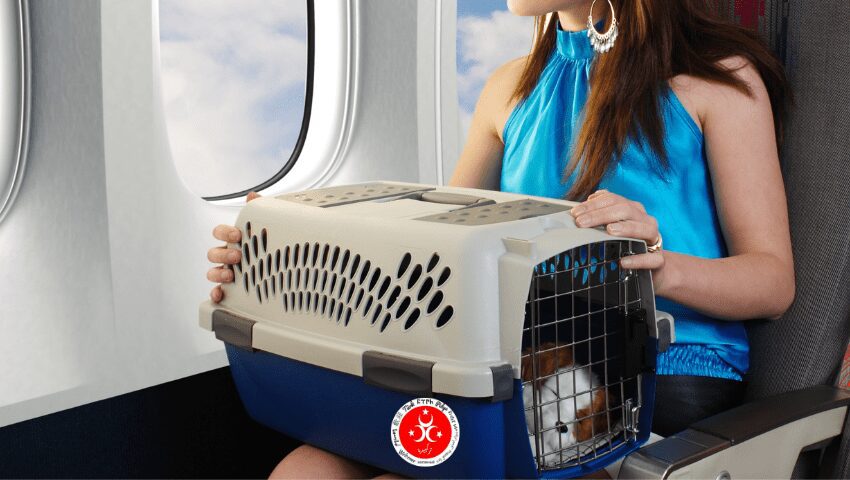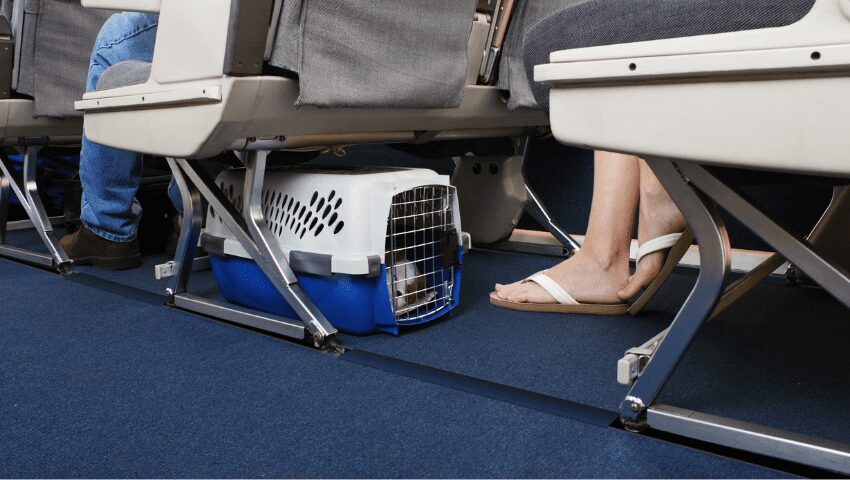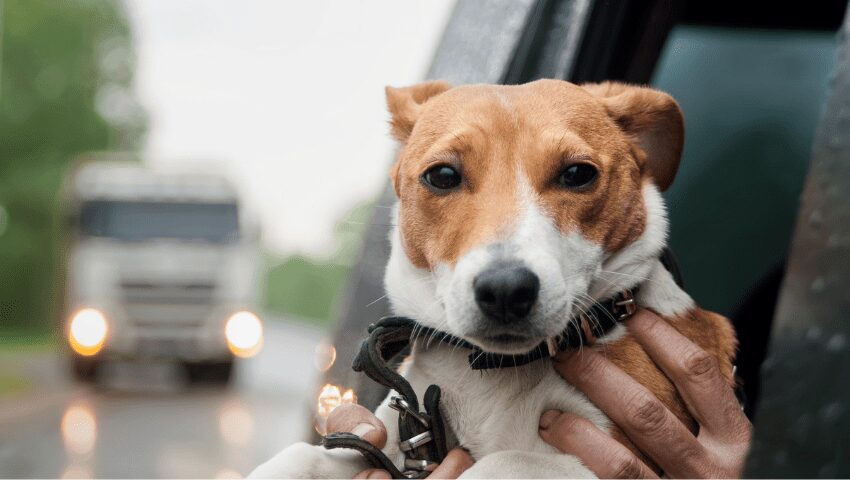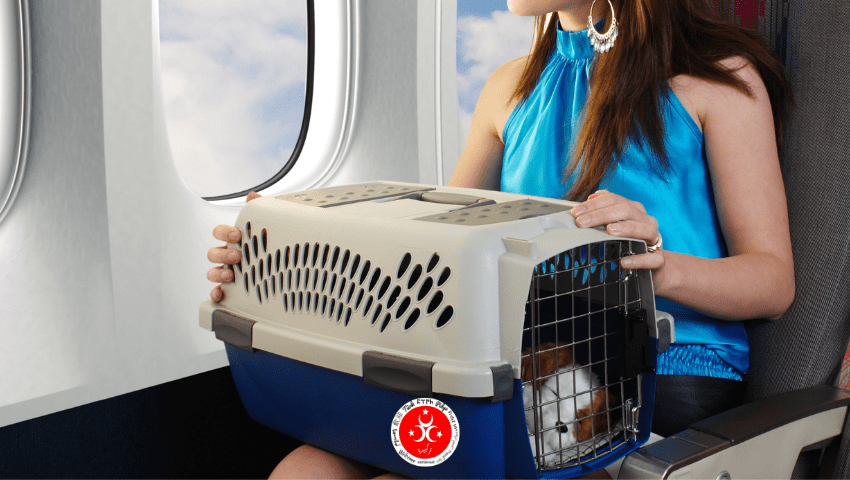Table of Contents
The thing that makes a holiday complicated is travelling with pets for a pet owner. But you need to make sure all transactions are correct and follow the rules.
Pets are cats and dogs that have valid vaccination and health certificates, entry permits, and/or other documents required by transit countries and can travel in a special cage.

How to Fly with Pet in Turkey
We’ve already spoken about the animals that qualify as pets. In this definition, the American Pitbull Terrier, the American Staffordshire Terrier, Bull Terrier, and Staffordshire Bull Terrier are not included.
Doberman or Rottweiler owners should get in touch with their airline as soon as possible to make arrangements for their hazardous dogs, such as Japanese tosa or Dogo Argentinao.
Traveling with a pet in the cabin on different airlines has different restrictions and procedures. In order to ensure you have the most current information on the application, you should contact the airline company as soon as possible.
There are limits on the number and kind of dogs that travelers may bring on aircraft. As a consequence, passengers may bring their dogs along for the ride by reserving them ahead of time.
The following are the general rules for travelling with pets within the framework of the airline’s procedure:
- There is a fee for travelling with pets. At the time of baggage delivery, the cage and animal are weighed together to determine this fee. Some airlines may also levy a fee at the time of booking.
- Pets are only permitted on board in the company of passengers.
- Pets can only be transported in cages specified by the airline and must be provided by the passenger who owns the pet.
- The name of the passenger and the animal should be labeled on the cage.
- The pet must be healthy, odorless, and harmless. If the animal’s condition is deemed suspicious (agitated, aggressive, diseased, etc.), the station staff may refuse to accept it for the flight.
- The passenger must keep the pet’s health certificate, vaccination paper, and ID with them at all times, including during the boarding process.
- Include your name, address, phone number, number of pets, and pet’s name on the information label on your pet’s cage.
- Pets are not permitted to enter, exit, or transit with passengers in some countries. Please contact the reservation or nearest ticket office of the airline you are flying with for more information.
- Depending on the airline, bookings for live animals in the cabin or cargo section must be made and authorized at least one hour before the departure time. You may check in your pet at the check-in desks if it’s traveling with you. You’ll want to bring your pet’s vaccination and health certificate with you throughout the admissions process.

Consider Your Pet’s Comfort
Our pet’s comfort is frequently more important than our own. In this case, there are some suggestions that we should consider in order to ensure their comfort while traveling with us.
Consider the following suggestions:
- First and foremost, a veterinarian check should be performed prior to the trip, the vaccination report should be completed, and a bag or cabin where the animal can stay comfortably should be purchased.
- Before the flight, get your pet used to its carrier.
- When pets are taken out of their natural environment, they are easily influenced by changes in sound, smell, and situation, and they become stressed.
- Animal relatives can make them feel more secure by covering the transport boxes with a blanket that they will keep. However, they should be cautious of the possibility that they will be affected by heat and a lack of air. As a result, the vehicle’s ventilation should be checked on a regular basis.
- Buy tickets with fewer connections or layovers.
- Choose your departure and arrival times carefully to avoid extreme heat or cold. Planning a nighttime arrival to a hot destination, for example, may be better for your pet.
- Speak with your veterinarian. Sedatives and tranquilizers are not recommended by the International Air Transport Association because they can harm animals in flight.
- Cats and dogs may pee and defecate, and they may vomit due to motion sickness as a consequence of stress. Consult a veterinarian if you know that your cat or dog may be damaged by the automobile ride, and then take the appropriate measures before leaving.
- Walk your pet before you leave the house and again before you check in.
- Check in as late as possible if your pet is permitted in the cabin to reduce stress.
- Check in early if your pet will be transported as cargo so that it can be placed in the plane’s quiet and dimly lit cargo hold.

Travelling with Pets on Turkish Airlines (THY) and Anadolu Jet
If you are wondering about the pet policy Turkish Airlines, we will explain it to you in this part of the article.
You can have permission in some situations for turkish airlines flying with pets. It is not so much different at turkish airlines pet travel. Your pet’s identity, a valid vaccination and health certificate, and, if traveling abroad, entry permits and other documents required by transit countries are all required by THY and Anadolu Jet.
Furthermore, turkish airlines and pets reservation must be made at least 6 hours before the flight time.
The number of pets that can be transported in the passenger cabin varies depending on the aircraft type.
Some “dangerous” breeds, such as the Doberman and Pitbull, are not permitted on the plane.
Travelling with pets turkish airlines and Anadolu Jet are used to pay for travelling. The extra baggage prices applied per kilo at THY are valid, whereas Anadolu Jet charges 49TL for 0-5 kg, 79TL for 6-15 kg, and 119TL for over 16kg.
Turkish Airlines pet carrier size should be 23x40x55 cm and the total weight of your pet to be taken into the cabin, including its cage/bag, should not exceed 8 kg. If the cage and pet weigh more than 8 kg, they are transported in the cargo compartment.
Each passenger is allowed a maximum of two cages. These cages are provided by you. Only one of the cages, however, is permitted to be transported turkish airlines pet in cabin.

Turkish Airlines Service Animal Policy
Service animals are animals that have been individually trained to do work or tasks for the benefit of a disabled person. Turkish airlines service animal acceptance is only limited with dog.
Dogs used in service must be trained and certified. Please ensure that the dog’s training certificate, vaccination card, pet passport – identification card, and any other documents required by the destination country’s rules are current and available.
If documents are missing, the service dog may be denied boarding or transported in the crate, passenger cabin, or aircraft hold.
In certain cases, an SVAN dog may not be permitted on board or in the cabin if it is aggressive at check-in and/or boarding, is not well-maintained and clean, exceeds a specific size, poses a safety danger, or if crew members say the dog may disrupt services or be carried.
With the exception of flights to and from the United States, THY requires individuals flying with assistance dogs to submit documented proof of their dog’s ability to discharge itself in a way that does not provide an immediate health or sanitation risk to other passengers.
Acceptable documents include:
- A veterinarian’s written declaration
- A written statement describing the passenger’s procedures for preventing the dog from relieving itself.
- A signed statement accompanied by photographs or other illustrations demonstrating the dog’s ability to relieve itself without causing a health or sanitation issue.
- A letter of undertaking stating that if the dog inadvertently relieves itself, the affected area will be thoroughly cleaned by the dog’s owner (please bring bags, napkins, wipes, etc.). All damages that may occur during travel are the responsibility of the passenger.
SVAN dogs must be clean and wear an identifying vest and/or harness. The dog must be seated in front of the passenger’s feet throughout the flight, and the extension of its leash or harness must be attached to the passenger’s belt. SVAN dogs are not permitted to sit in passenger seats. Passengers traveling with SVAN dogs must bring a muzzle in case of barking, bared teeth, etc.
Travelling with Pets on Pegasus Airlines
To travel with your pet Pegasus, call the call center and make a reservation.
For each flight, you must bring your dog’s health certificate, vaccination certificate, and identity card, as well as any other documents required for international flights and a pet passport.
A total of three pets weighing no more than eight kilograms each, including the cage, may enter the cabin. An eight-kilogram limit on the number of pets allowed per flight is enforced for the safety of passengers and crew.
You are responsible for your dog’s food and beverage needs in the cargo hold, but they provide catering support in the event of delays or disruptions.
Again, some “dangerous” dog breeds are not permitted on board.
Travelling with Pets by Bus in Turkey
If the animal’s relative believes that he or she cannot take responsibility for the animal during the journey and may cause discomfort to other passengers, they should not travel on public transportation with their animal.
On long trips, animals should be taken out of their carrying bags during a break, be carried on leashes or have their legs moved by hand, and be allowed to breathe and toilet. If there is no impediment, water and food can be given, but only in small quantities.
Pets such as cats, dogs (except dangerous ones), and birds (goldfinches, budgerigars, or canaries) with vaccination certificates can be transported on the passenger’s lap or in front of the seat where the animal’s owner is sitting, except in the luggage compartment, if their special cages are locked.
The following conditions must be met in order for pets to be transported in vehicle luggage compartments:
• As pets, only cats, dogs, and songbirds (parakeet, canary) are permitted.
• Pets, parcels, bags, and other items are not permitted to be transported in products. It can be transported in its special cages as long as they are locked. • Take care to ensure that the pet is healthy, clean, odorless, and calm-looking. Live animals in poor health or appearance are not transported.
• Pet’s health certificate, vaccination record, and so on. During the acceptance process, the documents must be with the passenger.

Travelling with Pets by Train in Turkey
Small transportable pets (birds, cats, fish, small dogs, etc.);
Cage sizes should be such that they can be carried on your knee.
Your pet should be kept in its cage and should not cause any damage or pollution to the wagon or the seat in which it will travel.
Other passengers should not be bothered by the smells and noises of transported animals.
During your trip, you should have the identity card and veterinary health report for the transported animals with you.
On main line trains, pets are not permitted in wagons other than covered bunk and sleeper wagons; in YHTs, pets are permitted in all wagons under the conditions stated above.
In addition, depending on the train and distance to which your pet will be transported, you must purchase your ticket at a 15% discount off the full standard ticket price.
If it is determined on the train that it does not meet the above conditions, you may be barred from continuing your journey, and the collected travel fee will not be refunded in any way.
Travelling with Pets on the Sea in Turkey
Travelling with Pets by Ferry (Istanbul Şehir Hatları)
Small pets in cages are transported to the passenger lounges. Pets without a cage are permitted to sail in safe areas designated by the ship’s officers, as long as they wear a muzzle. Transportation restrictions may be imposed depending on the type of ship and the suitability of the areas.
Guide dogs traveling with passengers, as well as dogs bred for emotional support, are permitted in the passenger lounges. Guide dogs should be seated at their owner’s feet and be leashed.
The pet must be odorless, harmless, and clean. Officers may refuse to accept pets that have the potential to harm other passengers and are seen as restless, aggressive, or suspicious.
Pets accepted on the expedition are the owners’ responsibility. City Hatlar A.. is responsible for the deterioration and loss of the pet’s health condition during or after the cruise on the ships or piers, as well as the costs and other damages that may occur as a result of these reasons. is not at all to blame. It is the responsibility of the pet owner to take the necessary precautions.
The pet owner is liable for any damage caused by their pets, including third parties, on piers and ships.
Travelling with Pets by Sea Taxi
Small pets in cages and dogs can ride on the IMM Sea Taxi with the passenger if they are on a leash and have muzzles attached.
The pet must be odorless, harmless, and clean. Officers may refuse to accept pets who appear to be restless, aggressive, or suspicious.
Pets accepted by IMM Sea Taxi are the owners’ responsibility. City lines is responsible for the deterioration and loss of the pet’s health condition during or after the cruise on the ships or piers, as well as the costs and other damages that may occur as a result of these reasons. is not at all to blame. It is the responsibility of the pet owner to take the necessary precautions.
Any damage caused by pets, including third parties, is the responsibility of the pet owner.
Travelling with Pets by Istanbul Sea Bus (IDO)
- Beginning March 1, 2012, our guests must carry vaccination cards for their pets, as they may be asked to show them to officers at embarkation points when traveling as a walk-on passenger, at security checks when traveling by car, or whenever it is requested during the sailing.
- All sea buses, conventional ferries, and fast ferries allow pets with vaccination cards to travel with their owners in the passenger lounges, as well as in the vehicles of their owners on the open deck of fast ferries and conventional ferries. This includes cats, dogs, and signing birds like budgerigars and canaries in special carrying cases.
- Carrying cases in the lounge must be no larger than 23x40x55 cm. Pets in carrying cases must travel alongside their owners (on the lap, on the floor next to the seat, etc.) in a suitable location and manner that does not disturb other guests or obstruct corridor passages.
- If pets are not allowed inside the passenger lounge because their carrying cases are larger than 23x40x55 cm, they must travel outside the passenger lounges on sea buses; in kennels available outside passenger lounges on ferryboats; and inside pet owners’ vehicles on fast ferries and conventional ferries with upper (open) deck.
- Pets must remain in their carrying cases or in the vehicles of their owners while traveling on fast ferries and conventional ferries with open decks. If pets are removed from carrying cases or vehicles, crew members have the authority to warn pet owners and remind them that pets should be returned to cases or vehicles.
- It is illegal to produce, own, bring into the country, sell or advertise, exchange, display, or make a present of a dangerous animal, such as a Pitbull Terrier or Japanese Tosa, Such species are not permitted to travel on board, according to the said Article. The compliance of pets that are requested to be transported is monitored at terminals in accordance with regulations.
- Dogs that cannot fit in carrying cases can travel on fast ferry trips as long as they wear a muzzle; however, such dogs are not permitted to travel on inner-city and intercity sea buses (vessels carrying only foot passengers).
- Dogs that cannot fit in kennels are required to board fast ferries from outside the terminal, provided they wear a muzzle (vehicle ticket booth – passenger exit).
- If, during related controls, pets cause officers to suspect their health condition or a possible disruption of the safe voyage, such pets may be denied passage.
- IDO accepts no responsibility for any deterioration in the health of the transported pets before, during, or after the voyage. Traveling with pets is permitted if our guests accept full responsibility. The transporter shall not be liable for pets that die, become ill, become lost, or are injured during the voyage, or for any other costs or damages incurred as a result of such events.
Consider Various Alternatives
Make sure your pet is in good enough health to fly. If you have any doubts, leave your pet with a trusted friend, family member, or boarding kennel during your trip, or take another mode of transportation.
Your pet will arrive at its destination and return home healthy and safe if you plan ahead of time.
Can i Travel with pets in Turkey
Yes, you can travel with your pets safely in Turkey in most transportations.






